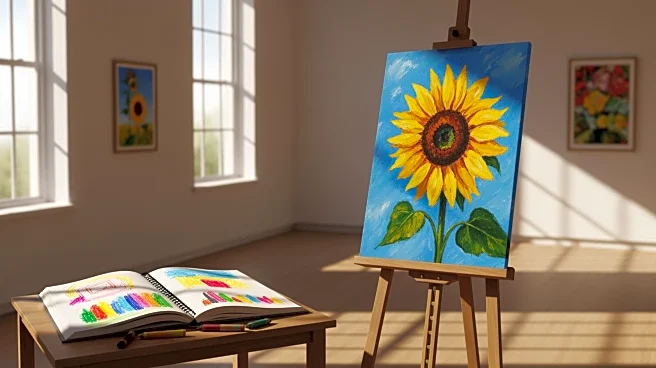What's Happening?
An art exhibition titled 'Faces of the Ukrainian Dream' has opened at Northampton Central Library, featuring drawings and stories from Ukrainian children affected by the Russian invasion. Organized by the Northampton branch
of the Association of Ukrainians in Great Britain, the exhibition aims to highlight stories of loss, courage, and hope. The event includes musical performances and a film screening, showcasing the talents of young Ukrainian refugees. Solomiia Blaghitko, one of the organizers, emphasized the importance of presenting the children's dreams and feelings, as they are now considered children of war. The exhibition coincides with World Children's Day and runs until November 24.
Why It's Important?
The exhibition provides a platform for Ukrainian children to express their experiences and aspirations amidst the ongoing conflict in their homeland. It serves as a poignant reminder of the impact of war on young lives and the resilience of children in the face of adversity. By sharing their stories, these children contribute to raising awareness about the humanitarian crisis in Ukraine and foster international solidarity. The event also highlights the role of art in healing and communication, offering a therapeutic outlet for children to process their emotions and connect with others.
What's Next?
The exhibition is expected to continue drawing attention to the plight of Ukrainian children and may inspire similar initiatives in other communities. As the event progresses, it could lead to increased support and advocacy for Ukrainian refugees, encouraging more organizations to engage in humanitarian efforts. The stories and artworks displayed may also influence public opinion and policy discussions regarding the conflict in Ukraine, potentially prompting further diplomatic and humanitarian actions.
Beyond the Headlines
The exhibition underscores the cultural and emotional dimensions of the Ukrainian refugee experience, highlighting the importance of preserving cultural identity and fostering community ties in times of crisis. It also raises ethical considerations about the responsibilities of host countries in supporting displaced populations, particularly children. The event may contribute to long-term shifts in how societies perceive and address the needs of refugees, emphasizing the value of empathy and cultural exchange.










